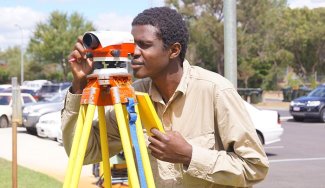

Why choose this course?
Expand your knowledge and experience of surveying with this qualification. This course will further your skills by teaching you how to conduct advanced Global Navigation Satellite Systems (GNSS) data collection and set out surveys, create engineering drawings and perform advanced surveying computations. You will be trained in the operation of sophisticated surveying equipment and software for conducting more complex engineering surveys, such as road designs.
This diploma has a focus on geodetic surveying including how to conduct geodetic surveys and perform computations. You will also develop industry specific skills including how to design basic engineering structures and plan spatial data collection. A large selection of electives is available to choose from, such as producing maps for land management purposes, producing mine drawings and how to set out stormwater systems.
On completion of this course you will be eligible for an associate membership of the Surveying and Spatial Sciences Institute (Engineering and Mining Commission).
If you wish to extend your career in this exciting industry then you can also study the CPP60121 Advanced Diploma of Surveying.
Career opportunities
- Mineral Processing Technician
- Surveying Assistant
When choosing a course, it's important to think about the key skills and knowledge you'll need, as well as how you'll be assessed. Take a look at this information and consider if you might face any challenges in meeting the course expectations and requirements.
- Good mathematics skills
- Able to work neatly and accurately
- Methodical with an eye for detail
- Able to communicate effectively with range of people and work within a team environment
- Enjoy practical work
- Ability to problem solve
-
An IELTS score (academic) of 6.0 with no band score less than 5.0 or equivalent.
-
Completion of CPP41721 Certificate IV in Surveying and Spatial Information Services (Surveying) (or equivalent) is required for entry into this course.
It is recommended that you have a valid driver’s licence and access to a private vehicle, as field work undertaken during this course may require travel to multiple sites.
There may be further semester intakes available for enrolment. You can view any further intakes when you submit your online application(opens in a new tab).
For information about pathways from TAFE to university, view our Pathways to university page.
How to apply
Apply to study at TAFE in six steps:
- find a course;
- check entry requirements;
- submit an application;
- accept your offer and pay;
- apply for your student visa; and
- receive your visa and come to Australia for your studies.
TIWA Course Guide
A guide to studying at TAFE in Western Australia, including study options, facilities and campus locations!
Download study area guide(opens in a new tab)
Contact us(opens in a new tab)
TAFE International Western Australia (TIWA) is the Registered Training Organisation (RTO) and Commonwealth Register of Institutions and Courses for Overseas Students (CRICOS) provider, for the delivery of training to international students, enrolled in a TAFE course in Western Australia. This nationally recognised course is delivered by a Western Australian TAFE college on TIWA's behalf. TIWA retains responsibility for the quality of the training and assessment delivered by the TAFE colleges and for the issue of certification documentation to students.


